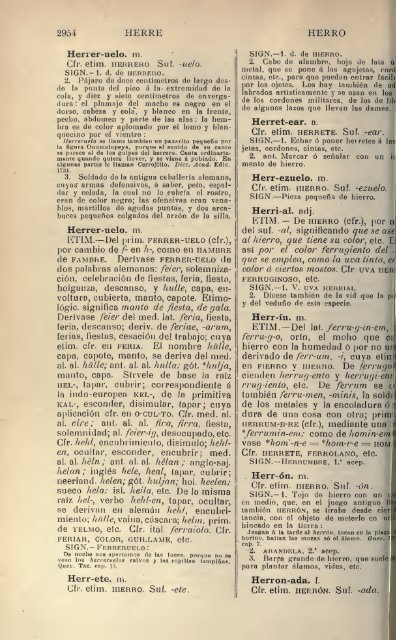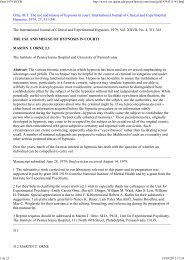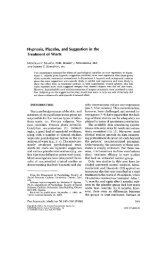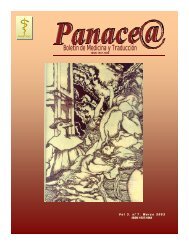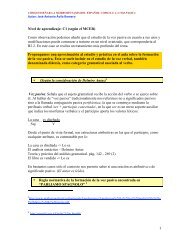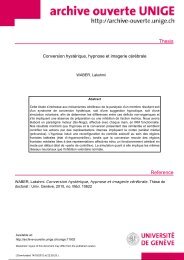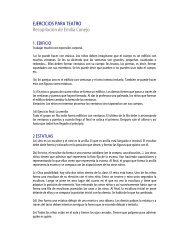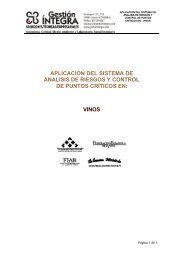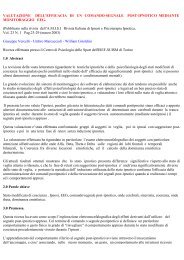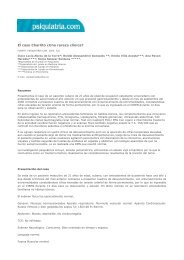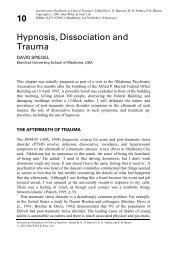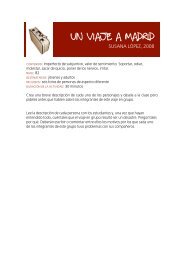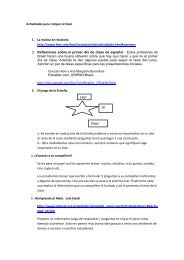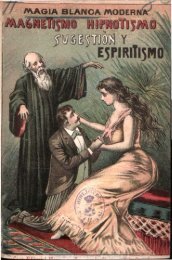Diccionario filológico-comparado de la lengua castellana
Diccionario filológico-comparado de la lengua castellana
Diccionario filológico-comparado de la lengua castellana
You also want an ePaper? Increase the reach of your titles
YUMPU automatically turns print PDFs into web optimized ePapers that Google loves.
2954 HERRÉ HERRÓ<br />
Herrer-uelo. m.<br />
Gfr. etim. herrero. Siif. -uelo.<br />
SlGN.-l. d. <strong>de</strong> herrero.<br />
2. Pájaro <strong>de</strong> doce centímetros <strong>de</strong> <strong>la</strong>rgo <strong>de</strong>s<strong>de</strong><br />
<strong>la</strong> punta <strong>de</strong>l pico á <strong>la</strong> extremidad <strong>de</strong> <strong>la</strong><br />
co<strong>la</strong>, y diez y siete centímetros <strong>de</strong> envergadura:<br />
el plumaje <strong>de</strong>l macho es negro en el<br />
dorso, cabeza y co<strong>la</strong>", y b<strong>la</strong>nco en <strong>la</strong> frente,<br />
pecho, abdomen y parte <strong>de</strong> <strong>la</strong>s a<strong>la</strong>s : <strong>la</strong> hembra<br />
es <strong>de</strong> color aplomado por el lomo y b<strong>la</strong>nquecino<br />
por el vientre :<br />
Herreruelo se l<strong>la</strong>ma también un paxarito pequeño por<br />
<strong>la</strong> figura Onomatopeya, porque el sonido <strong>de</strong> su canto<br />
se parece al <strong>de</strong> los golpes <strong>de</strong>l herrero. Canta ordinariamente<br />
quando quiere llover, y se viene á pob<strong>la</strong>do. En<br />
algunas partes le l<strong>la</strong>man Cerrojillo. Dice. Acad. Edic.<br />
1734.<br />
3. Soldado <strong>de</strong> <strong>la</strong> antigua caballería alemana,<br />
cuyas^ armas <strong>de</strong>fensivas, é saber, peto, espaldar<br />
y ce<strong>la</strong>da, <strong>la</strong> cual no le cubría el rostro,<br />
eran <strong>de</strong> color negro; <strong>la</strong>s ofensivas eran venablos,<br />
martillos <strong>de</strong> agudas puntas, y dos arcabuces<br />
pequeños colgados <strong>de</strong>l arzón <strong>de</strong> <strong>la</strong> sil<strong>la</strong>.<br />
Herrer-uelo. m.<br />
rOTÍM.— Del |)riíii. ferrer-uelo (cír.),<br />
por cambio <strong>de</strong> f- en A-, como en hamdre<br />
<strong>de</strong> FAMBhE. Derívase ferrer-uelo <strong>de</strong><br />
dos pa<strong>la</strong>bras alemanas: feier^ solemnización,<br />
celebración <strong>de</strong> fiestas, feria, fíes<strong>la</strong>,<br />
holganza, <strong>de</strong>scanso, y hulle^ capa, envoltora,<br />
cubierta, manto, capote. Etimológic.<br />
significa manto <strong>de</strong> fiesta, <strong>de</strong> ga<strong>la</strong>.<br />
Derívase feier <strong>de</strong>l med, <strong>la</strong>t. feria, fiesta,<br />
feria,, <strong>de</strong>scanso; <strong>de</strong>riv. <strong>de</strong> feriae, -arum,<br />
ferias, fiestas, cesación <strong>de</strong>! trabajo; cuya<br />
etim. cfr. en feria. El nombre hüUe,<br />
capa, capote, manto, se <strong>de</strong>riva <strong>de</strong>l med.<br />
al. al. halle; ant. al. al. hul<strong>la</strong>/ gót. *hulja,<br />
manto, capa. Sírvele <strong>de</strong> base <strong>la</strong> raíz<br />
HEL-, tapar, cubrir; correspondiente á<br />
<strong>la</strong> indoeuropea kel-, <strong>de</strong> <strong>la</strong> primitiva<br />
KAL-, escon<strong>de</strong>r, disimu<strong>la</strong>r, tapar; cuya<br />
a|)licnción cfr. en o-cul-to. Gfr. med. al.<br />
al. vire; ant. al. al. fira, firra, fiesta,<br />
solemnidad; al. feier-ig, <strong>de</strong>socupado, etc.<br />
Cfr. hehi, encubrimiento, disimulo; hehlen,<br />
ocultar, escon<strong>de</strong>r, encubrir; med.<br />
al. al. héln ; ant. al. al. he<strong>la</strong>n ; anglo-saj.<br />
he<strong>la</strong>n; inglés hele, heal, tapar, cubrir;<br />
neeriand. helen; gót. huljan; hol. lieelen;<br />
sueco he<strong>la</strong>; isl. hei<strong>la</strong>, etc. De <strong>la</strong> misma<br />
raíz hel-, verbo hehl-en, tapar, ocultar,<br />
se <strong>de</strong>rivan en alemán liehl, encubrimiento;<br />
/ía//e, vaina, cascara; lielm, prim.<br />
<strong>de</strong> YELMO, etc. Gfr. ital ferraiolo. Gfr.<br />
FERIAR, COLOR, GUILLAME, CtC.<br />
SIGN.- Ferreruelo ;<br />
De noche nos .ipiirtamos <strong>de</strong> <strong>la</strong>s Iucps, porque no se<br />
vean los herreruelos calvos y l.as ropil<strong>la</strong>s <strong>la</strong>mpiñas.<br />
Quev. Tac. cap. I:}.<br />
Herr-ete. m.<br />
Gfr. etim. hierro. Suf. -ete.<br />
SIGN.— 1. d. <strong>de</strong> hierro.<br />
2. Cabo <strong>de</strong> a<strong>la</strong>mbre, hoja <strong>de</strong> <strong>la</strong>ta ú<br />
metal, que se pone á <strong>la</strong>s agujetas, oord<br />
cintas, etc., para que puedan entrar fácili<br />
por los ojetes. Los hay también <strong>de</strong> ad<br />
<strong>la</strong>brados artísticamente y se usan en los<br />
<strong>de</strong> los cordones militares, <strong>de</strong> los <strong>de</strong> lib<br />
<strong>de</strong> algunos <strong>la</strong>zos que llevan <strong>la</strong>s damos.<br />
Herret-ear. a.<br />
Gfr. etim. herrete. Suf. -ear.<br />
SIGN.—1. Echar ó poner herretes á <strong>la</strong>s<br />
jetas, cordones, cintas, etc.<br />
2. ant. Marcar ó seña<strong>la</strong>r con un ii<br />
mentó <strong>de</strong> hierro.<br />
Herr-ezuelo. m.<br />
Gfr. etim. hierro. Suf. -esuelo.<br />
SIGN.—Pieza pequeña <strong>de</strong> hierro.<br />
Herri-al. adj.<br />
ETIM. — De hierro (cfr.), i)or n<br />
<strong>de</strong>l suf. -«/, significando que se ase<br />
al hierro, que tiene su color, etc. E<br />
así por el color ferrugiento <strong>de</strong>l .<br />
que se emplea, como <strong>la</strong> uva tinta, ei<br />
color á ciertos mostos. Gfr uva her<br />
ferruginoso, etc.<br />
SIGN.— 1. V. UVA HERRIAL.<br />
2. Dícese también <strong>de</strong> <strong>la</strong> vid que <strong>la</strong> pi<br />
y <strong>de</strong>l veduño <strong>de</strong> esta especie.<br />
Herr-ín. m.<br />
ETIM.— Del <strong>la</strong>t. ferru-g-in-em,<br />
ferru-g-o, orín, el moho que ci<br />
hierro con <strong>la</strong> humedad ó por no uí<br />
<strong>de</strong>rivado <strong>de</strong> ferr-um, -i, cuya etirr<br />
en FIERRO y hierro. De ferrugo<br />
cien<strong>de</strong>n herrug-ento y herrugi-eni<br />
rrug-iento, etc. De ferrum se<br />
también ferru-men, -minis, <strong>la</strong> soldi<br />
<strong>de</strong> los metales y <strong>la</strong> enco<strong>la</strong>dura ó<br />
dura <strong>de</strong> una cosa con otra; prim<br />
HERRUM-B-RE (cfr.), mediante una<br />
*ferrumin-em; como <strong>de</strong> homin-em<br />
vase *hom'-n-e = *hom-r-e = hom<br />
Gfr. HERRETE, FERROLANO, etC.<br />
SIGN.— Herrumbre, 1." acep.<br />
. Herr-ón.<br />
m.<br />
Cfr. etim. hierro. Suf. -ón.<br />
SIGN.— 1. Tejo <strong>de</strong> hierro con un<br />
en medio, que, en el juego antiguo 11<br />
también herrón, se tiraba <strong>de</strong>s<strong>de</strong> cief<br />
tancia, con el objeto <strong>de</strong> meterlo en uf<br />
hincado en <strong>la</strong> tierra :<br />
Juegan á <strong>la</strong> tar<strong>de</strong> al herrón, tocan en <strong>la</strong> p<strong>la</strong>z%<br />
borino, bai<strong>la</strong>n <strong>la</strong>s mozas só el á<strong>la</strong>mo. Ouev.<br />
cap. 7.<br />
2. ARANDELA, 2." acep.<br />
3. Barra gran<strong>de</strong> <strong>de</strong> hierro, que sueU<br />
para p<strong>la</strong>ntar á<strong>la</strong>mos, vi<strong>de</strong>s, etc.<br />
Herron-ada. f.<br />
Gfr. etim. herrón. Suf. -ada.


